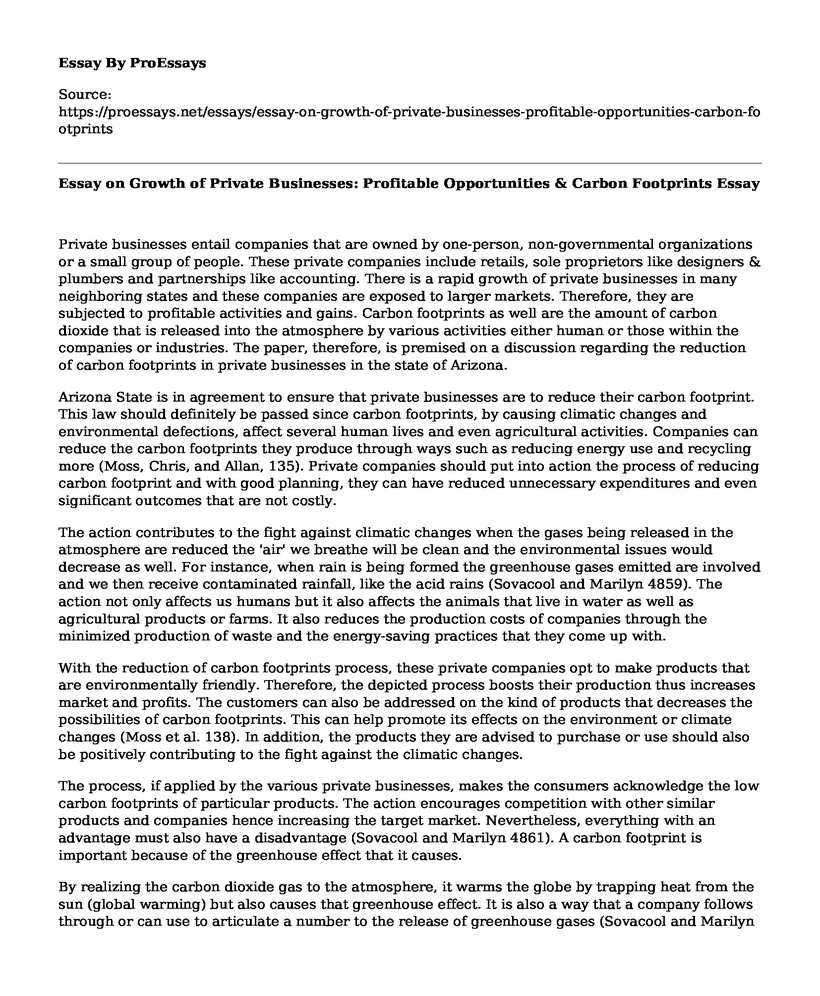Private businesses entail companies that are owned by one-person, non-governmental organizations or a small group of people. These private companies include retails, sole proprietors like designers & plumbers and partnerships like accounting. There is a rapid growth of private businesses in many neighboring states and these companies are exposed to larger markets. Therefore, they are subjected to profitable activities and gains. Carbon footprints as well are the amount of carbon dioxide that is released into the atmosphere by various activities either human or those within the companies or industries. The paper, therefore, is premised on a discussion regarding the reduction of carbon footprints in private businesses in the state of Arizona.
Arizona State is in agreement to ensure that private businesses are to reduce their carbon footprint. This law should definitely be passed since carbon footprints, by causing climatic changes and environmental defections, affect several human lives and even agricultural activities. Companies can reduce the carbon footprints they produce through ways such as reducing energy use and recycling more (Moss, Chris, and Allan, 135). Private companies should put into action the process of reducing carbon footprint and with good planning, they can have reduced unnecessary expenditures and even significant outcomes that are not costly.
The action contributes to the fight against climatic changes when the gases being released in the atmosphere are reduced the 'air' we breathe will be clean and the environmental issues would decrease as well. For instance, when rain is being formed the greenhouse gases emitted are involved and we then receive contaminated rainfall, like the acid rains (Sovacool and Marilyn 4859). The action not only affects us humans but it also affects the animals that live in water as well as agricultural products or farms. It also reduces the production costs of companies through the minimized production of waste and the energy-saving practices that they come up with.
With the reduction of carbon footprints process, these private companies opt to make products that are environmentally friendly. Therefore, the depicted process boosts their production thus increases market and profits. The customers can also be addressed on the kind of products that decreases the possibilities of carbon footprints. This can help promote its effects on the environment or climate changes (Moss et al. 138). In addition, the products they are advised to purchase or use should also be positively contributing to the fight against the climatic changes.
The process, if applied by the various private businesses, makes the consumers acknowledge the low carbon footprints of particular products. The action encourages competition with other similar products and companies hence increasing the target market. Nevertheless, everything with an advantage must also have a disadvantage (Sovacool and Marilyn 4861). A carbon footprint is important because of the greenhouse effect that it causes.
By realizing the carbon dioxide gas to the atmosphere, it warms the globe by trapping heat from the sun (global warming) but also causes that greenhouse effect. It is also a way that a company follows through or can use to articulate a number to the release of greenhouse gases (Sovacool and Marilyn 4862). Without the action, the companies will not be capable to measure or know the total sets of gases being emitted within, which may lead to more environmental problems that include chemical pollution.
Conclusion
Carbon footprint, as explained above, is seen to be a major contributor to global warming which causes deaths, climate changes and environmental issues given that it also helps in the greenhouse effect. Private businesses are therefore advised to reduce their carbon footprint in order to improve the business and save the production costs & the earth; humans and other living things.
Works Cited
Moss, Jessica, Chris G. Lambert, and Allan EW Rennie. "SME application of LCAbased carbon footprints." International Journal of Sustainable Engineering 1.2 (2008): 132-141. doi: 10.1080/19397030802332930
Sovacool, Benjamin K., and Marilyn A. Brown. "Twelve metropolitan carbon footprints: A preliminary comparative global assessment." Energy policy 38.9 (2010): 4856-4869. doi: 10.1016/j.enpol.2009.10.001
Cite this page
Essay on Growth of Private Businesses: Profitable Opportunities & Carbon Footprints. (2023, Mar 13). Retrieved from https://proessays.net/essays/essay-on-growth-of-private-businesses-profitable-opportunities-carbon-footprints
If you are the original author of this essay and no longer wish to have it published on the ProEssays website, please click below to request its removal:
- Essay on Important Changes for Businesses and Managers as They Relate to SOX
- Leadership, Strategic Thinking and Leadership Interview Questions
- Essay Sample on Personal Improvement Plan
- Essay on Improving Teacher Induction Programs Through Supervision & Staff Development
- Essay Example on Conflict in Organizations: Types, Causes, Effects and How to Address
- Essay on 2010 Haiti & Chile: How Political Instability Impacted Natural Disaster Relief
- Environmental Conservation: Protecting Nature for Our Future - Essay Sample







